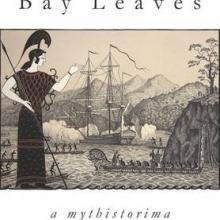
ITHACA
Lynley Dear
Astra Print, $30, pbk
With the exception of some publicity close to home, Southland author and poet Lynley Dear's first novel, Ithaca, seems to be flying under the radar since its release late last year, so I am glad to be able to sing its praises.
Although it is billed on the back cover as a touching and memorable love story in the tradition of Colleen McCullough's The Thorn Birds, I can assure you that off-putting comparison can be ignored.
Although it includes a love affair involving a priest, which is thankfully handled with restraint, the novel's scope goes far beyond that, conveying a family story across several generations in carefully crafted prose.
Given the beauty of some of the phrasing, it is evident the author is a poet.
Dear covers a lot of ground, from 1920s Scotland to modern-day New Zealand, with episodes also set in Israel, England and Germany. Framing the narrative is a connection to events touched on at the beginning of the novel surrounding the death in Jerusalem in 1236 of a Crusader, Philip d'Aubigny, who was the Governor of the Channel Islands and among those present at the signing of the Magna Carta in 1215.
When he succumbed to illness while taking part in the Fifth Crusade, he was buried in the Church of the Holy Sepulchre in Jerusalem, a rare honour.
The main character, Cecily McCallum (nee Daubeny), is Philip's descendant.
The connection to him is discovered when the coat of arms on his tomb is recognised as being the same as that depicted on a ring Cecily inherited.
Not only does this function as an intriguing plot device, it also mirrors an identical discovery in Dear's own family.
Philip d'Aubigny is actually her ancestor and the heirloom ring belonged to her great-uncle, George Daubeny. Truth is indeed stranger than fiction in this case.
While history provides the backbone for Ithaca, the novel is fleshed out with the lives of four generations of women from a family that emigrated to New Zealand from Scotland in 1926 to settle in Invercargill.
Their struggles and misunderstandings could easily have been reduced to saga material, but Dear strikes a balance between dramatic tension and credible emotion and the result is poignant and accomplished.
She especially nails the embarrassment and pretensions of Cecily's social-climbing daughter when her mother has a breakdown.
Cecily's treatment at the hands of her family, who abandon her to the Seacliff mental hospital, is heartbreaking, an impression achieved without resort to melodramatic embellishment.
Ithaca, named in reference to Homer's Odyssey, is a testament to courageous women and the suffering of those who emigrated to this country in times gone by.
It is infused with historical references, touching on many events, people and places, especially in 20th-century New Zealand.
I found this background absorbing, informative and, when referring to the South, easy to relate to.
Ithaca is an impressive debut and I hope it gets the attention it deserves.
Caroline Hunter is a Dunedin writer and editor.












